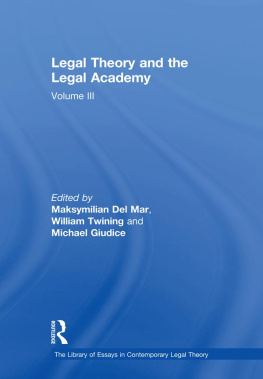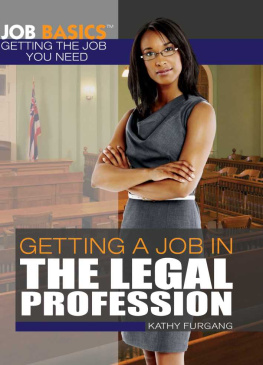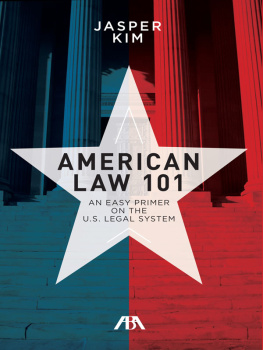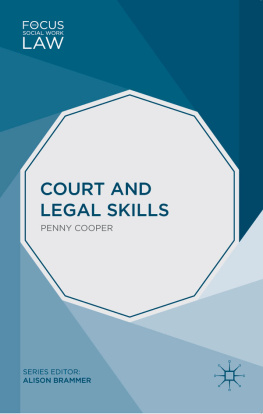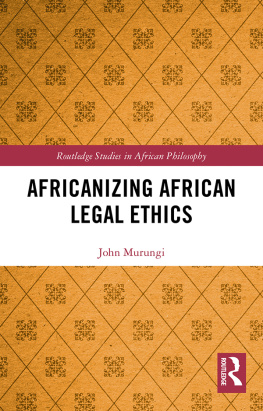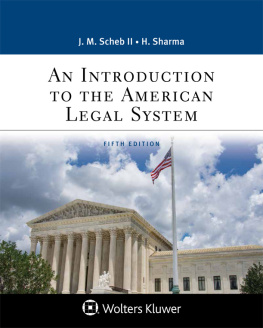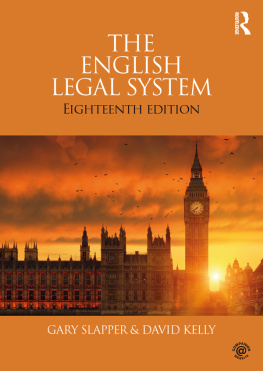LEGAL LITERACY
OPEL ( OPEN PATHS TO ENRICHED LEARNING )
Series Editor: Connor Houlihan
Open Paths to Enriched Learning (OPEL) reflects the continued commitment of Athabasca University to removing barriersincluding the cost of course materialsthat restrict access to university-level study. The OPEL series offers introductory texts on a broad array of topics, written especially with undergraduate students in mind. Although the books in the series are designed for course use, they also afford lifelong learners an opportunity to enrich their own knowledge. Like all AU Press publications, OPEL course texts are available for free download at www.aupress.ca, as well as for purchase in both print and digital formats.
SERIES TITLES
Open Data Structures: An Introduction
Pat Morin
Mind, Body, World: Foundations of Cognitive Science
Michael R.W. Dawson
Legal Literacy: An Introduction to Legal Studies
Archie Zariski

LEGAL LITERACY
An Introduction to Legal Studies
ARCHIE ZARISKI

Copyright 2014 Archie Zariski
Published by AU Press, Athabasca University
1200, 10011 109 Street, Edmonton, AB T 5 J 3 S 8
ISBN 978-1-927356-44-9 (print) 978-1-927356-45-6 ( PDF ) 978-1-927356-46-3 (epub) doi: 10.15215/aupress/9781927356449.01
Cover illustration: 2014 Phil Bliss c/o theispot.com
Interior design by Sergiy Kozakov
Printed and bound in Canada by Marquis Book Printers
Library and Archives Canada Cataloguing in Publication
Zariski, Archie M., 1949-, author
Legal literacy : an introduction to legal studies / Archie Zariski.
(Open paths to enriched learning (OPEL) series, 2291-2606 ; . 3)
Includes bibliographical references.
Issued in print and electronic formats.
1. Law--Canada--Textbooks. 2. Sociological jurisprudence--Canada--Textbooks. I. Title.
KE444.Z37 2014 349.71 C2014-901205-5
KF385.ZA2Z37 2014 C2014-901206-3
We acknowledge the financial support of the Government of Canada through the Canada Book Fund (CFB) for our publishing activities.

Assistance provided by the Government of Alberta, Alberta Multimedia Development Fund.

Please contact AU Press, Athabasca University at for permissions and copyright information.
This book is dedicated to Kim, with love.
CONTENTS
PREFACE
The inspiration for this text is partly autobiographical in natureit reflects issues I have confronted in my life. My first career was as a lawyer practising in the field of litigation, where I became fluent in the discourse of legal argument at trials and appeals. The evidentiary techniques, legal jargon, and adversarial strategizing I learned at law school were put to good use in the service of clients large and small. After fifteen years of this work, the thrill of battle wore off and I became interested in more cooperative ways to solve legal problems. I had also always wanted to teach. Consequently, I resolved to become a law teacher, with the aim of training lawyers to be problem-solvers instead of gladiators.
My next career was launched when I obtained a graduate degree by researching the then-new field of alternative dispute resolution. As a novice teacher, I came to see that traditional law school pedagogical techniques often reinforced a confrontational mindset among fledgling lawyers, encouraging them to view themselves as privileged insiders in the legal system without much concern for the real needs of their clients beyond winning the court battle. Lawyers were being trained from day one to see society exclusively through legal eyes that keenly recognized legal concepts and issues arising in everyday events, but were blind to clients underlying desires and the emotions that motivated them. Many call this learning to think like a lawyer. It could also, I think, be considered a dehumanizing educational process that should be changed.
Early in my teaching career, I came into contact with students in legal studies who were eager to learn about the law, but not necessarily for the purpose of becoming a lawyer. They needed some of the same knowledge and technical capabilities employed by law students, but were less tolerant of jargon and traditional law school pedagogy. I decided to start teaching some law subjects, such as research and writing, to both legal studies and law students in a more accessible and less elitist way.
As a teacher of alternative dispute resolution (ADR), I became aware of the wider field of socio-legal studies, where it was born and nurtured. Scholars of anthropology, sociology, psychology, and other disciplines have looked at law and legal processes as a subset of other individual and social phenomena. Their studies have illuminated the connection (and disjuncture) between law and society. ADR scholars have focused on the particular ways in which legal systems respond, or fail to respond to social conflict, and critics, such as those in the access to justice movement, and have asked questions about whom the law really serves. Increasingly, these and other perspectives on law and how it is practised have made their way into law schools.
As a student of the economic analysis of law, I learned that the material conditions of law practice and legal processes can have real effects on outcomes for clients and society as a whole. Some of the traditional elements of our legal system, such as legal publishing and information dissemination, seemed to be impediments to a fair justice system. The barrier of copyright and prevalence of legal writing that is unclear and full of jargon can be at least partly blamed for the widespread ignorance among the population of their legal rights and obligations. Once again, I decided to adjust my teaching practice in order to bring it in line with the requirements of plain language and equitable access to legal information.
Most recently I have become engaged with the open access movement in law and education. As a faculty member of an open university that offers distance education, I have a keen appreciation for the publics need for quality education and sound legal help. This experience has led me to value legal literacy, not as an indicator of the professional superiority of lawyers, but as an essential capacity for all citizens in a society permeated by law. And thus I have written this book, dedicated to educating all about their legal rights and objectives, and to improving law through informed critique, and articulating the demands of the society it serves. I believe everyone should know how law seeks to achieve justice in and for society, not for laws sake alone.
I acknowledge and thank anonymous reviewers of the manuscript who pointed out shortcomings and suggested improvements. Thanks also to Pamela Holway and Connor Houlihan, editors at Athabasca University Press, for their insight and encouragement which stimulated completion of the book; Elaine Fabbro at Athabasca University Library for exploring the world of online legal research with me; and students in the legal literacy course at the university who continue to pose fresh questions about law and legal systems.
INTRODUCTION
This book is for readers who wish to know enough about law and legal systems to be able to accomplish something within the law or to go about changing it. In other words, the information found here should help readers accomplish some legal tasks themselves and offer a constructive critique of law and its institutions. Legal studies is a term with a broad meaning but is usually contrasted with law studies or studying law, which are most often used to describe preparation for professional practice as a lawyer. Studying law is comparable to learning a new language. Students in law schools report feeling that they are being taught to take on a new identity as part of learning to think and speak like a lawyer. As a result of intensive immersion in legal culture during the course of their studies, lawyers emerge with a distinct view of the world and a specific language to express that vision. They largely lose the ability to both think and speak as anything other than a lawyer. Legal studies, however, attempts to preserve what we might call students bilingual or bicultural capacities by allowing them to see the world simultaneously like a lawyer and a layperson.
Next page

